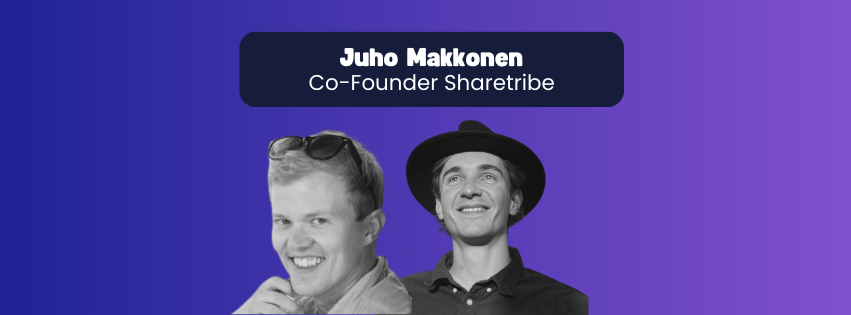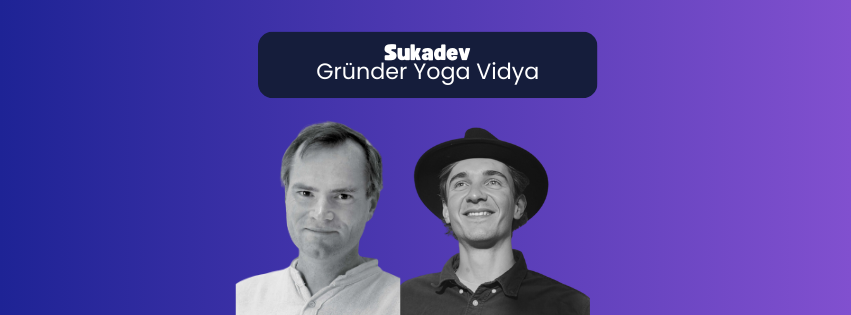Juho, the co-founder of Sharetribe, recently shared his incredible journey in an insightful podcast interview with Manuel on Why, Not How, available on Spotify. In their conversation, Juho discussed his transition from a traditional tech startup approach to a model rooted in purpose-driven values, and the key decisions he made to shape the future of Sharetribe. Here’s a deeper look into Juho’s evolution as an entrepreneur, the challenges he faced, and how he pivoted towards building a social startup with impact at its core.
From Tech Student to Social Impact Entrepreneur
Juho’s entrepreneurial path began as an unlikely one. With no entrepreneurs in his family, Juho was initially more focused on programming and technology than on business. His background was in software engineering and information networks, a combination of business, design, and engineering that gave him a well-rounded skill set for building digital products. Though he didn’t start his university career with the idea of becoming an entrepreneur, he always had a strong desire to make a positive impact.
In the early years, Juho explored various opportunities in tech but realized that entrepreneurship could provide the control and leverage he needed to maximize his impact on the world. As he began to learn more about the sharing economy, he saw an exciting possibility: combining his passion for digital products with an opportunity to help people collaborate, share resources, and reduce waste. This led to the creation of Sharetribe.
The Birth of Sharetribe: A Research Project Turned Business
Sharetribe’s origins trace back to a research project at Aalto University in Helsinki, where Juho and his co-founder Antti began exploring the idea of a peer-to-peer marketplace. Initially, the project was designed to help students buy and sell used goods and borrow items from one another. This small-scale initiative soon attracted the attention of people outside the university, and the duo realized they were onto something much bigger.
With the rise of social entrepreneurship and the growing interest in the sharing economy, Sharetribe quickly transitioned from a university project into a full-fledged business. But what started as a simple platform for students to share items soon evolved into a marketplace platform that enabled others to launch their own localized sharing economies. At this stage, the idea of creating a tech-for-equity platform for entrepreneurs was born.
Pivoting to Purpose-Driven Values
As Sharetribe grew, Juho and his team began to face a major challenge: the pressure to scale quickly and meet traditional venture capital expectations. In 2015, they were presented with a crossroads—continue down the path to becoming a unicorn through large-scale funding or stick to their values and build a more sustainable, impact-driven company.
Juho’s realization came when they started looking at companies like Airbnb and Uber, which, despite their innovative services, were causing social and ethical issues due to their profit-driven models. This prompted Juho and his co-founders to rethink their mission and purpose. They refocused their efforts on building a company that wouldn’t just profit from marketplace transactions but would also empower individuals to own and control their platforms.
In 2015, Sharetribe’s mission shifted from simply helping the world share to democratizing platform ownership. Juho and his team saw an opportunity to use their technology to empower local communities, giving them the ability to create their own marketplaces that were more ethical, localized, and impact-driven.
Embracing Stewardship Ownership
One of the most pivotal decisions Sharetribe made was adopting the stewardship ownership model. This model, which they learned about in 2017, allowed them to retain control over the company’s mission and structure while still being able to raise funding. It was a model that would allow them to keep the company’s purpose aligned with their values, without being driven solely by profit.
With the adoption of this model, Sharetribe was able to fundraise through a crowdfunding round, raising over one million euros. This allowed them to buy back shares from their previous investors and regain control of the company’s future. The decision was not easy, but it was one that allowed Sharetribe to remain focused on its mission of building a sustainable business model while having the ability to support early-stage entrepreneurs through their marketplace platform.
The Open-Source Dilemma
A critical element of Sharetribe’s platform was its open-source model, which enabled entrepreneurs to launch their own peer-to-peer marketplaces. However, as Juho explained, they soon encountered challenges with open-source competitors. Some larger companies took the open-source code, repurposed it, and undercut Sharetribe by offering similar features at a lower cost.
While this was frustrating, Juho saw it as part of the open-source philosophy. However, it also highlighted a major product decision: building a fully open-source product was not the most effective way to offer value to their customers, especially when their goal was to enable marketplace entrepreneurs to build businesses without needing a large budget for custom development. Instead, Sharetribe decided to keep the core platform proprietary while offering an open-source front-end for customization. This decision allowed them to maintain control over the business while still offering flexibility to their customers.
Five Key Learnings from Juho’s Journey
- Know your values and align your business model: Understand what you want out of life and ensure your company’s mission supports your personal values. This will help create a business that is sustainable and fulfilling.
- Don’t be afraid to pivot: Juho and his team learned the importance of listening to customer feedback and adapting their business model. The decision to pivot towards purpose-driven values was key to Sharetribe’s success.
- Focus on community-driven growth: Building a business that serves a specific niche or community rather than a mass market can be far more impactful and sustainable. Juho’s experience showed that community-focused platforms are more likely to thrive.
- Purpose over profit: Aligning business objectives with a social impact mission can not only create a meaningful business but also build trust and loyalty among your customers, employees, and investors.
- Build flexibility into your business model: Sharetribe’s ability to adapt to open-source challenges and investor pressures without compromising its core values highlights the importance of building a business that can evolve with changing market demands.
Juho’s journey is a powerful reminder for early-stage entrepreneurs that there are alternative ways to build a scalable startup without compromising on values or mission. Sharetribe is an inspiring example of how impact-driven ventures can succeed by focusing on long-term sustainability over short-term profits, empowering entrepreneurs to create businesses that are both socially responsible and financially viable.
Key Takeaways:
- Starting a business aligned with your personal values is essential for long-term satisfaction and success.
- Don’t be afraid to pivot when you realize your original model isn’t serving the market’s needs.
- Focusing on niche markets and building a community is often more sustainable than targeting a mass audience.
- A purpose-driven business model can offer more than just financial returns—it can create lasting impact.
- Stewardship ownership can be an effective model for ensuring a company remains mission-aligned, even as it grows.
Juho’s story proves that it is possible to build a startup that is both financially successful and deeply committed to making the world a better place.



